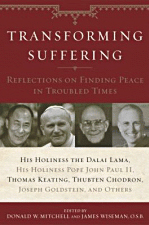In the second Gethsemani Encounter, held in 2002 at the abbey in Kentucky, Christian and Buddhist monks gathered to talk about human suffering in today's troubled world. Some of the key questions they addressed, according to editors Donald Mitchell and James Wiseman, were: What can our spiritual traditions offer to suffering humanity today? How does one find emotional healing? How are we to deal with anger, jealousy and pride? How does one confront violence and abuse? How can you become free from unhealthy attachments to people and things, or status and security? How can you let go of control and find freedom? How do you come to terms with sickness, aging, and eventually death? Both His Holiness the Dalai Lama and His Holiness Pope John Paul 11 contributed their thoughts on suffering to the conference participants, who included Thomas Keating, Joseph Goldstein, Thubten Chodron, Robert Aitken, Zoketsu Norman Fisher, Henepola Gunaratana, Mary Margaret Funk, Ajahn Amaro, John Daido Lorri, Father Columba Stewart, and Geshe Lhundub Sopa, and others.
We like the quaint way the Venerable Henepola Gunaratana defined the main issue:
"There are many kinds of rings: wedding rings, engagement rings, earrings. But there is one ring that we all have, whether Buddhist, Hindu, Muslim, Christian, Jew or no religion. All living beings have suffering. Suffering is universal. We cannot totally eliminate it. Because of our modern technology, we have discovered various things to combat suffering, prolong our life a bit, overcome many sicknesses, eliminate some poverty, provide better sanitation, and so forth. But in spite of all these modern developments, suffering still exists. It has not totally been eliminated. It can never be fully eliminated from the world."
Ajahn Amaro points out that the cross is the perfect spiritual symbol since it is like the letter "I" is crossed out. The Buddhists reveal that selflessness is the antidote to selfishness. Both groups of monks agree that letting go is the best way to transform human suffering.
